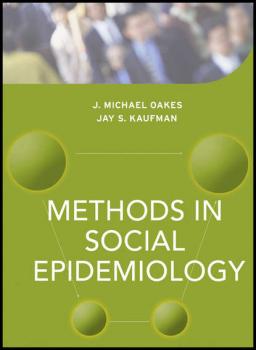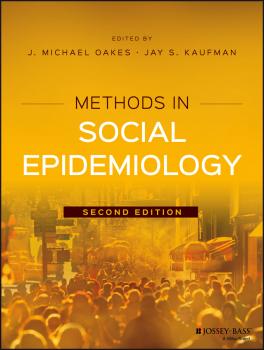Jay Kaufman S.
Список книг автора Jay Kaufman S.Methods in Social Epidemiology
Social epidemiology is the study of how social interactions—social norms, laws, institutions, conventia, social conditions and behavior—affect the health of populations. This practical, comprehensive introduction to methods in social epidemiology is written by experts in the field. It is perfectly timed for the growth in interest among those in public health, community health, preventive medicine, sociology, political science, social work, and other areas of social research. Topics covered are: Introduction: Advancing Methods in Social Epidemiology The History of Methods of Social Epidemilogy to 1965 Indicators of Socioeconomic Position Measuring and Analyzing 'Race' Racism and Racial Discrimination Measuring Poverty Measuring Health Inequalities A Conceptual Framework for Measuring Segregation and its Association with Population Outcomes Measures of Residential Community Contexts Using Census Data to Approximate Neighborhood Effects Community-based Participatory Research: Rationale and Relevance for Social Epidemiology Network Methods in Social Epidemiology Identifying Social Interactions: A Review, Multilevel Studies Experimental Social Epidemiology: Controlled Community Trials Propensity Score Matching Methods for Social Epidemiology Natural Experiments and Instrumental Variable Analyses in Social Epidemiology and Using Causal Diagrams to Understand Common Problems in Social Epidemiology. «Publication of this highly informative textbook clearly reflects the coming of age of many social epidemiology methods, the importance of which rests on their potential contribution to significantly improving the effectiveness of the population-based approach to prevention. This book should be of great interest not only to more advanced epidemiology students but also to epidemiologists in general, particularly those concerned with health policy and the translation of epidemiologic findings into public health practice. The cause of achieving a ‘more complete’ epidemiology envisaged by the editors has been significantly advanced by this excellent textbook.» —Moyses Szklo, professor of epidemiology and editor-in-chief, American Journal of Epidemiology, Johns Hopkins University «Social epidemiology is a comparatively new field of inquiry that seeks to describe and explain the social and geographic distribution of health and of the determinants of health. This book considers the major methodological challenges facing this important field. Its chapters, written by experts in a variety of disciplines, are most often authoritative, typically provocative, and often debatable, but always worth reading.» —Stephen W. Raudenbush, Lewis-Sebring Distinguished Service Professor, Department of Sociology, University of Chicago «The roadmap for a new generation of social epidemiologists. The publication of this treatise is a significant event in the history of the discipline.» —Ichiro Kawachi, professor of social epidemiology, Department of Society, Human Development, and Health, Harvard University «Methods in Social Epidemiology not only illuminates the difficult questions that future generations of social epidemiologists must ask, it also identifies the paths they must boldly travel in the pursuit of answers, if this exciting interdisciplinary science is to realize its full potential. This beautifully edited volume appears at just the right moment to exert a profound influence on the field.» —Sherman A. James, Susan B. King Professor of Public Policy Studies, professor of Community and Family Medicine, professor of African-American Studies, Duke University
Methods in Social Epidemiology
A thorough, practical reference on the social patterns behind health outcomes Methods in Social Epidemiology provides students and professionals with a comprehensive reference for studying the social distribution and social determinants of health. Covering the theory, models, and methods used to measure and analyze these phenomena, this book serves as both an introduction to the field and a practical manual for data collection and analysis. This new second edition has been updated to reflect the field's tremendous growth in recent years, including advancements in statistical modeling and study designs. New chapters delve into genetic methods, structural cofounding, selection bias, network methods, and more, including new discussion on qualitative data collection with disadvantaged populations. Social epidemiology studies the way society's innumerable social interactions, both past and present, yields different exposures and health outcomes between individuals within populations. This book provides a thorough, detailed overview of the field, with expert guidance toward the real-world methods that fuel the latest advances. Identify, measure, and track health patterns in the population Discover how poverty, race, and socioeconomic factors become risk factors for disease Learn qualitative data collection techniques and methods of statistical analysis Examine up-to-date models, theory, and frameworks in the social epidemiology sphere As the field continues to evolve, researchers continue to identify new disease-specific risk factors and learn more about how the social system promotes and maintains well-known exposure disparities. New technology in data science and genomics allows for more rigorous investigation and analysis, while the general thinking in the field has become more targeted and attentive to causal inference and core assumptions behind effect identification. It's an exciting time to be a part of the field, and Methods in Social Epidemiology provides a solid reference for any student, researcher, or faculty in public health.

